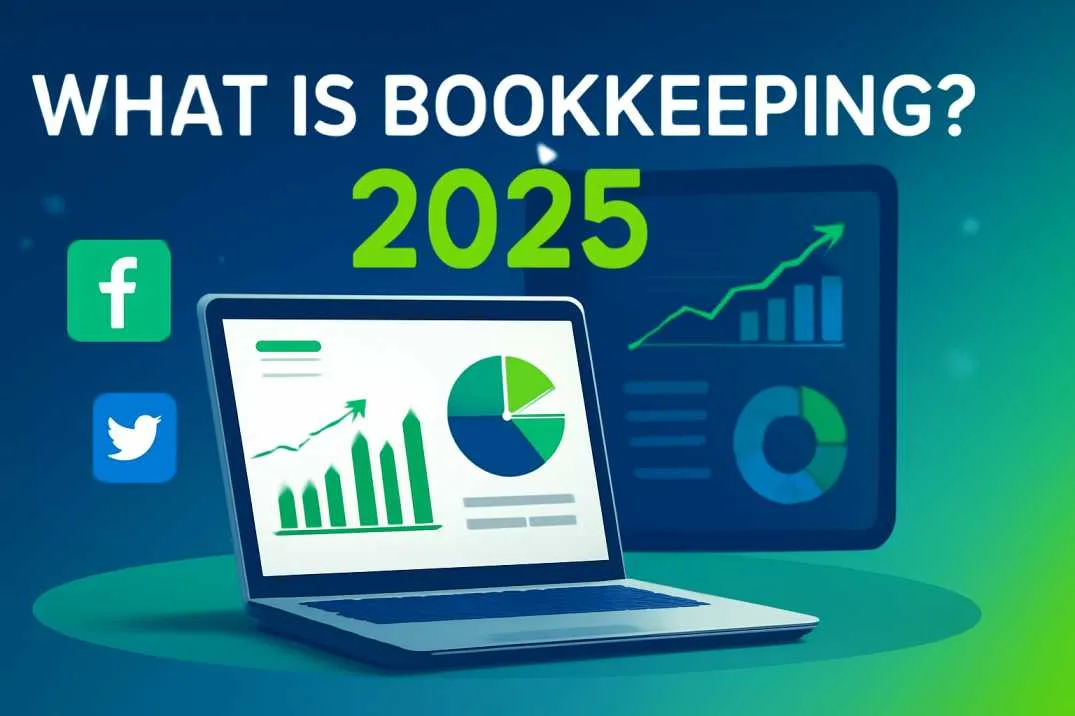What Is Bookkeeping? A Simple Guide for Small Business Owners
Have you ever found your finances a bit overwhelming? Then you should consider bookkeeping for your small business right away.
Don’t know completely about bookkeeping? No problem. We will guide you through so you can gain success in your small business.
Understanding Bookkeeping Fundamentals
Effective financial management starts with a solid foundation on bookkeeping principles. Bookkeeping is the process of recording and managing a business's financial transactions.
Definition and Purpose of Bookkeeping
Bookkeeping is a systematic recording of financial transactions, including income, expenses, assets, and liabilities. Its main purpose is to provide a clear and accurate data of a company's financial position.
Why Bookkeeping Matters for Small Businesses
For small businesses, bookkeeping is important for several reasons. It helps in managing cash flow, tracking expenses, and preparing for tax season. Accurate bookkeeping also helps businesses to identify areas of improvement in their finances.
Need to outsource your bookkeeping? Contact here.
The Difference Between Bookkeeping and Accounting
Bookkeeping and accounting are closely related but they serve different purposes. Bookkeeping focuses on recording financial transactions, on the other hand accounting includes analyzing financial data to prepare financial statements and tax returns.
Essential Bookkeeping Processes for Small Businesses
Having knowledge of relevant bookkeeping processes and setting them correctly is fundamental to the financial success of small businesses. These processes allow businesses to maintain accurate accounting records and then make appropriate financial decisions.
Recording Financial Transactions
The recording of financial transactions forms a basis for bookkeeping. Every financial event such as income, expense, transferring balances must be captured through a systematic channel into financial books so that the data is correctly entered, complete, and updated.
Accounts Receivable And Payable Management
Cash flow is jeopardized without managing accounts receivable and payable properly. Receivables and payables are amounts that are being tracked in respect of the business to ensure that payments are timely and to maintain cordial relationships with suppliers and customers.
Bank Statement Reconciliation
Bank statement reconciliation is essential for maintaining accurate financial records, internal to an organization, and comprises the comparison of records maintained within an entity with those provided by the banks. This step in accounting also identifies discrepancies with its records.
Generation of Financial Reports
Generation of financial reports is an essential step for properly understanding a business. The financial report can be generated from the journals, ledgers and the other finalized data.
Tax Considerations for Small Business Bookkeeping
Tax considerations play a significant role in small business bookkeeping. This includes understanding tax obligations, maintaining accurate records for tax purposes, and ensuring compliance with tax laws and regulations. Key tax considerations include:
● Accurate income and expense tracking
● Claiming eligible deductions and credits
● Maintaining records for tax audits
Need help with your taxes? Contact here.
Implementing Effective Bookkeeping Systems
An organized system of bookkeeping is necessary to carry out sound business decisions. For the small business owner, it allows keeping track of the financial health, testing opportunities for improvement, and planning really well.
Single-Entry vs. Double-Entry Bookkeeping Methods
As simple as it can be, the single-entry bookkeeping method just records every transaction once, hence suited to small businesses with simple financial transactions. Double-entry bookkeeping, on the other hand, looks at each transaction twice: as a debit entry for one account, and as a credit entry for another account, thus accounting for every relevant aspect of an event.
Cash vs. Accrual Accounting
Essentially, cash accounting registers revenues and expenses at the time of exchanging cash, whereas accrual accounting records revenues at the point of earning and expenses at the point of being incurred, irrespective of the actual cash flow. Choosing one or the other is dependent on the business's size, complexity, and industry.
Choosing And Purchasing Bookkeeping Software
Selecting appropriate bookkeeping software is essential in good management of the finances. QuickBooks and Xero are popular choices that allow the user to automate the recording of transactions, send invoices, or even generate certain financial reports.
Setting Up of a Chart of Accounts
A good chart of accounts is necessary for the orderly management of financial information. Accounts will be categorized under assets, liabilities, equity, revenues, and expenses for proper accounting of financial transactions.
Common Bookkeeping Mistakes to Avoid
Some of the common mistakes include not reconciling the bank statements on a regular basis, misclassifying transactions, and poor record-keeping. Avoiding these will safeguard the financial data and allow you to make right decisions.
The Solution: Unlock your business potential with Topoutsourcingpartners
Already overwhelmed? We, Top outsourcing partners, are here for you.
At Top Outsourcing Partners, we uplift businesses by providing them with industry-leading solutions in Accounting & Finance, AI Integration, Third-Party Business Support, Corporate Training, and HR & Payroll. We have a dedicated team that will work with your finances.
Stay ahead of your finances with our advanced Accounting and Finance services that will surely reduce your finance related headache.
Here we have services like -
● Bookkeeping & Payroll Management
● CFO Services (Virtual & On-Demand)
● Accounts Payable & Receivable Management
● Tax Preparation & Compliance
● Financial Reporting & Analysis
Why hire us?
● We operate from Bangladesh. So, it is cost-effective from any other services.
● The time difference will be a huge advantage for the project's productivity.
● We ensure the data security of our client’s data.
Conclusion: Taking Control of Your Business Finances
Good bookkeeping is the backbone of a successful small business, enabling control over its finances and insight into making decisions. The knowledge of the bookkeeping fundamentals, conducting necessary bookkeeping processes, and keeping best bookkeeping practices will enable any small business owner to maintain accurate financial books and further grow his/her business.
Choosing a good bookkeeping software, setting up the chart of accounts, and regularly reviewing financial reports are crucial in bringing your business finances under control. While reviewing reports, you can find out areas for improvement, and apply such knowledge to improve financial management and make data-driven decisions to push the business further.
By adopting best bookkeeping practices and having control over their finances, a small business owner can decrease financial strain on their life, increase profits, and secure long-term success. Start applying these strategies today to take a load off your financial management and lead the happy days for your future.





